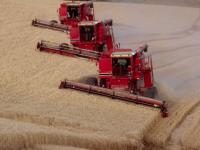 |
|
|
|
Ruin of Harvest in Russia Will Shake World Markets
11.08.2009 — Analysis Russia may have to face a food crisis next winter. Whole fields of fodder and cereal crops have been withered by scorching sun in the European part of the country. The RusBusinessNews observer found out how big the losses in the Urals are, and what farmers and grain traders should expect in 2010.
Russian agrarians are finishing stocking up the fodder for the winter and have serious reasons for a grave concern. 243 thousand hectares of crops have burnt out in the Chelyabinsk Oblast. Kurgan farmers need three tons of coarse and succulent fodder per one animal; they now have stocked up only 15-20% of the required amount. In the Sverdlovsk Oblast the level of fodder inventory is one third lower than last year. The situation is relatively stable only in the Western Siberia and Prikamye (lands near the Kama river). Stocking up fodder is going according to plan in the Tyumen Oblast. Country dwellers, however, do not think there would be any surplus. Only the Perm Krai, one of the very few subjects of the Russian Federation, managed to accumulate some reserves. Agrarians are left without fodder due to the unpredictable Urals weather. The region has traditionally been considered high-risk for crop farming, whilst June had been uncustomary hot this year. The air in the Kurgan Oblast got as hot as 30 centigrade, ground - plus 50. Emergency situation has been declared due to drought in some districts of the Chelyabinsk Oblast. The end of July saw some rain at long last. These rains were not much help to farmers. "We have not seen hail like this for 15 years," Pavel Vasin, Director of the Kalininskaya Agro Company (Chelyabinsk), told RusBusinessNews. "435 hectares of crops had suffered then. This time we lost 3,000 hectares of wheat, 716 hectares of annual grasses, 639 hectares of barley, 223 hectares of peas, and 100 hectares of oats." Urals agrarians are trying to find, quickly, places where more hay can be cut - fields and pastures which are unused currently. Yuri Simonov, a specialist from the Department for International Relations of the Ministry for Agriculture of the Chelyabinsk Oblast, informed RusBusinessNews that, as of 6 August 2009, the total area of hayfields has exceeded the plan 1.5 times and only 60% of the needed fodder has been stocked up. Some agrarians started the second sowing of annual plants in hope that by the fall it would be possible to add the new seedlings to the stockpile. If that does not work, then it would be necessary to import fodder into the region. Agrarians from other subjects of the Russian Federation are unlikely to be able to help their colleagues in the Urals. Almost all of the European part of Russia has suffered from the drought. Shortages of cereals may amount to 10-15 million tons in the country as a whole. The Orenburg Oblast has lost more than 80% of cereals to the drought; the damage amounts to billions of roubles. Even if some reserves are found, it is as likely as not that, in the situation of shortages, the market prices for fodder and cereals will start creeping up. This might worsen the financial situation in the agricultural sphere. The debts of the Urals agricultural companies have already reached hundreds of millions of roubles. In the beginning of the sowing season agrarians were buying seeds against the future harvest, and leased and took out loans for equipment. The grasses have burned together with the money; many agricultural companies are now on the brink of bankruptcy. They do not expect any help from local authorities. The Department for Agriculture and Processing Industry of the Kurgan Oblast informed RusBusinessNews that in the current situation of crisis the local budget simply does not have any funds available. The Governor of the Chelyabinsk Oblast Pyotr Sumin promised to help the countryside: 331 million roubles will be allocated to purchase fodder. This, however, is only a part of the money needed. The money will mainly be made available to those companies which raise cattle. Small farms, most likely, will have to slaughter the animals having no food for them. The Russian Prime Minister Vladimir Putin promised to help Russian farmers. In the beginning of August 2009 in the field meeting in the Orenburg Oblast he made a statement that a hundred billion roubles can be allocated for the overcoming of consequences of the drought and natural disasters. It is not clear, however, how soon the money would reach the regions, nor how it will be distributed. Even if the problem is resolved within the country, the loss of millions of tons of agricultural products in the burnt-out Russian fields will still affect the world markets. Last year Russian agrarians managed to harvest 108 million tons of cereals - a record-breaking amount for the post-Soviet time. More than 20% of it was officially reported to have been exported abroad. Russian grain took up to 14% of the world market. This year the country will not be as generous. This is why the world cereals prices might start to creep up by the autumn. Yevghenia Yeryomina |
| Regions | Project participants | Investment projects | Consulates and Trade Offices | News and Analysis | About the Project |
|
© RusBusinessNews, 2009. All rights reserved. Establishing a hyperlink to RIA RusBusinessNews is required for using any of the material published on this website. News and analytical reviews are translated into foreign languages by the TRANSLIT Translation Agency |
«Sum of technologies»® Web design Site promotion |